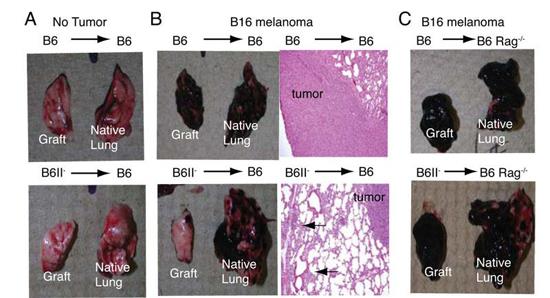
Alexander Krupnick, MD
Surgical Director of Lung Transplant
Associate Professor of Surgery
University of Virginia
Cancer remains a leading cause of death in the Western world despite advances in surgical techniques and chemotherapy. Denovo expressed and over expressed of multiple tumor-related antigen could, in theory, serve as a therapeutic target for immune-mediated tumor elimination, but malignancies escape immune recognition and establish tumor-specific tolerance once clinically evident. Our laboratory has focused on understanding the mechanism of tumor tolerance induction and over the last two years has initiated two specific areas of investigation. We are actively studying the role of tumor-associated non-hematopoietic cells, such as vascular endothelium, in the immunologic induction of tolerance to pulmonary metastases. A separate project focuses on immunosurveillance by the innate immune system for primary murine lung cancer. Investigations of lung transplantation, performed in the same laboratory as studies of tumor tolerance induction, offer a unique opportunity to apply principles of allograft rejection to the field of tumor immunology and vice versa. Ready access to human tumor samples from the principal investigator’s clinical practice offers a unique opportunity to perform correlative studies, as well.
Representative Publications

|
|
A) Comparison of lung cancer in urethane-treated wild-type, Rag-/-, or athymic nude (nu/nu) mice on a B6 background. B) Comparison of lung cancer in B6 mice depleted of natural killer cells with anti-NK1.1 or isotype control antibodies. C) Lysis of LLC and LM-2 lung cancer cell lines by freshly isolated B6, 129/SvEv and AJ natural killer cells. From: Kreisel D, Gelman AE, Higashikubo R, Lin X, Vikis HG, White JM, Toth KA, Deshpande C, Carreno BM, You M, Taffner SM, Yokoyama W, Bui JD, Schreiber RD, Krupnick AS. Strain-Specific Variation in Murine Natural Killer Gene Complex Contributes to Differences in Immunosurveillance for Urethane- Induced Lung Cancer. Cancer Research 2012 Jun 29. Reprinted with permission of Cancer Research. See full article. |

|
|
Tumor immune response is altered in the absence of MHC Class II expression on pulmonary non-hematopoietic cells. Gross appearance and weights of wild-type B6 and B6 MHC Class II- grafts and native right lungs (A) without and (B) after injection of B16 melanoma demonstrates that metastatic tumors do not grow in the lung in the absence of MHC Class II expression on non-hematopoietic cell. Hematoxylin and eosin staining of grafts indicating melanoma (labeled as tumor) and inflammatory infiltrates (arrows). (C) Gross appearance and weights of wild-type B6 and B6 MHC Class II- grafts four weeks after transplantation into B6 Rag-/- mice injected with B16 melanoma indicates that the differences in tumor growth are the result of the adaptive immune response. From: Kreisel D, Richardson SB, Li W, Lin X, Kornfeld CG, Sugimoto S, Hsieh CS, Gelman AE, Krupnick AS. Cutting edge: MHC class II expression by pulmonary nonhematopoietic cells plays a critical role in controlling local inflammatory responses. J Immunol. 2010 Oct 1;185(7):3809-1 Reprinted with permission of The Journal of Immunology. See full article. |